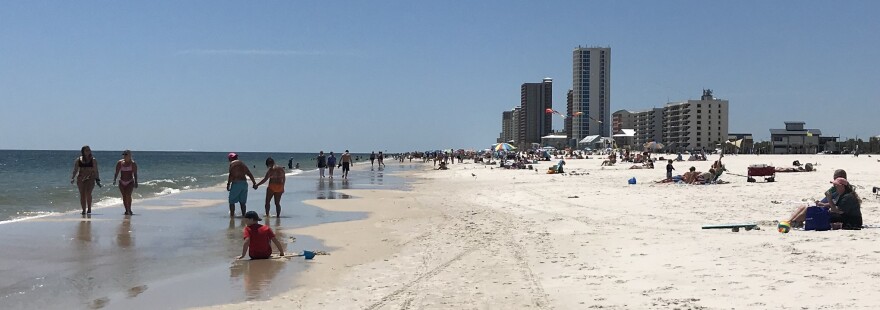An Alabama Public Radio news feature, which is part of APR effort to address the "news desert" along the state's Gulf coast. APR recruited and trained veteran print journalists in Mobile and Baldwin counties to join our news team to do radio stories from along the Gulf coast.
The tourism industry along Alabama’s Gulf coast is taking the first steps toward recovery after spring business was lost due to COVID-19. The state’s beaches will be open again for a second weekend after being shut down since mid-March. The sands are crowded, but, so far, visitors are following state rules, staying in groups of less than 10 and keeping 6 feet apart. Alabama’s tourist economy spent 42 days with empty beaches. That meant no visitors during the height of the spring break tourist season. When the coast reopened last week, visitors, residents and local businesses were ready.
“When the orders expired at 5 o’clock, at around 4:30, we started noticing people,” said Gulf Shores spokesperson Grant Brown. "Actually, they’d park their vehicles and they started walking and appropriately social distancing on the sidewalk, but they were waiting to actually get into our beach areas at the public beach. It was that much, I think, of a pent-up demand, I think it was mostly locals that are ready to be get back on the beaches.”
Brown said the beaches filled up quickly after restrictions were lifted.

“A lot of Baldwin County tags, a lot of out-of-town tags.” Brown said. “It’s a combination of people here from other places, whether they’ve travelled here specifically for this or whether they were already here because they were either owners that own places and are now coming down here, but the beaches are, I would say, fairly busy right now.”
One concern on the coast, however, is an instant replay of what happened in other areas if the beach gets too popular. Orange County, California, reopened its beaches. But, closed them down again after crowds packed the sands.
"I think that’s the biggest fear that we all have is that if we as individual people, whether you live here or you’re coming in from other places, if you don’t do the responsible thing and keep distancing away from each other and just enjoy but do so safely, it’s very possible that the beaches could be taken away from us again,” he said.
“We have been one day at a time,” said Deborah Tarr, who owns the Tiki Boutique in Gulf Shores. “Little by little with every new little sale, we can have one of our managers come in. So, each day was a different scenario and it was literally paycheck to paycheck, day to day.”
Taxes from small businesses like Tarr’s means around 30 percent of Alabama’s annual state budget. Tarr said good times for the Tiki Boutique means good times for the state.
“We had a Mother’s Day deadline as far as finances and whatnot and we were opened before Mother’s Day,” Tarr said. “When you hear April and then you hear May, we say, 'OK, Mother’s Day is mid-May. If we can be open by Mother’s Day, we’ll be able to breath I think.' So we are thankful, but the past two months have been a rollercoaster.”
Police and lifeguards have been enforcing state social distancing rules and that will apply to this coming weekend.
“That’s why we’re going to be out in full force,” said Orange Beach mayor Tony Kennon, “because it doesn’t matter if you like the rules or you don’t like the rules. The rules are the rules and everybody’s going to follow the rules. Period. We’re going to expect that.”
Kennon doesn’t want a repeat of Spring Break when both college students and families crowded the beaches. Concerns over spreading the coronavirus prompted the city of Gulf Shores to close its beaches, even before the statewide ban.
“We don’t want the beaches closed because of the actions of a few knuckleheads, so we’re not going to allow the governor’s office, who gave us a chance, to be embarrassed by a few knuckleheads,” Kennon said. “We’re going to work hard to do it the right way.”

Kennon said the COVID-19 closings hit the economy harder than the 2010 oil spill.
“If you look at the economics, we are probably far worse than we were during the oil spill. And the reason is during the oil spill, people who were here were able to spend money,” Kennon said. “Restaurants were open. Retail was open. Everything was wide open. But since the first of April, we’ve essentially had every type of business shut down.”
Businesses have been trying to hang on for the last two months. Tarr who owns the said beach customers were waiting the moment the restrictions were lifted.
“We opened last night at 5 p.m. and we hit a little surge of some groups of ladies especially excited to be out and about our welcoming them was as exciting for us as it was for them,” she said.
Like many business owners reopening across Alabama, Tarr said they’ll keep working to deal with the economic impact of COVID 19
“All small businesses are trying to decide now what, so we will facilitate our funds accordingly. We feel as if there are holes and gaps that we need with our merchandise but we have to take each day at a time and make sure that our payroll can first be met so it will be interesting over the next few weeks, but at least we are open with a 6-feet stipulation. We are OK, because we are open,” she said.







